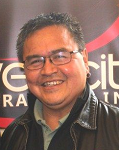First Nations' Relationship to the Land
Indigenous peoples have the right to maintain and strengthen their distinctive spiritual relationship with their traditionally owned or otherwise...

Keith Matthew, founder, Seklep Business Services, is a member of and former chief of the Simpcw First Nation. He served for five years as chief and five years as Councilor up until December 2010. In this interview with workingeffectivelywithaboriginalpeoples.com Keith shares some valuable insights from his perspective as a negotiator for his community and as a business leader on structuring negotiations with First Nations.
When did you start Seklep Business Services and what is your business focus? I started up Seklep Business Services in January 2011 to assist businesses both Aboriginal and non-Aboriginal do business with First Nations people and organizations here in BC.
During your tenure as first a Councilor and then as Chief of the Simpcw First Nation, what did you learn that helps you in your business today as a consultant in providing advice to your clients?As a chief and councillor for my community I was primarily responsible for economic development. I was on council for ten years - there is no handbook on how to be a councilor or chief - you have to learn as you go and take whatever short courses or training programs available. I was our primary negotiator on a number of agreements notably our impact business agreements with Canadian Hydro, an independent power project, and Kinder Morgan Canada's TMX Anchor Loop Pipeline Project.
The best lesson I received was from our legal counsel at the time, Michael McDonald, who shared with me how to raise funding for negotiations and hiring professionals to support the negotiations. It was a simple lesson but I haven't seen too many of our communities use it successfully. The ones that do use it are involved in projects and helping their people find training and full time jobs. There needs to be a negotiator with a mandate from council and then support from the community for the project. Getting community support is often very tricky and involves the negotiations team taking the information to the community and off-reserve membership and structuring communications packages for the information sessions and the ratification vote. Having an independent auditor for the community vote is essential for fairness and transparency. More important is having a plan in place for any funds that have been attached to the agreement. In our case we developed a community trust that is supposed to grow over time and support community led initiatives that are often unfunded like the rebuilding of our language, culture and history.
What do you feel is your most important legacy to the Simpcw First Nation from your terms as Councilor and then Chief? There are a couple important legacies that I have left my community and both are important for us to nurture and grow over time. The first is the business knowledge and project management experience that our community members and leadership have received from participating in successful major projects in our territory. This has led to the development of many of our current joint ventures through Simpcw Resources Group and we are just scratching the surface with these vehicles that create important, own-sources revenues and job opportunities for our membership and other people.
The foundation for our economic development arm was the creation of a Simpcw Consultation and Accommodation framework that was created to take advantage of the Haida and Taku River Supreme Court of Canada decisions on consultation. The Shuswap Nation Tribal Council learned from the Delgamuukw Supreme Court of Canada decision that you need to be proactive and assert your jurisdiction so we created the consultation and accommodation framework as a tribal group and worked with the West Coast Environmental Law Group who helped us draft the policy. We also worked concurrently on a heritage policy and our strength of claim research to produce a map of our territory that is appended to the policy to provide third parties, governments and other people wanting to do business on our territory a clear way forward to doing business with us.
Wealth management is not primarily about managing money but assisting our communities to get beyond day to day living and breaking away from unhealthy patterns that have dogged us from our days in residential schools. This was one of the motivating factors in developing the Simpcw Heritage Trust. It is based on our traditional laws of putting away resources for that inevitable downturn and sharing amongst ourselves to help the weakest and most vulnerable.
These are the legacies I am most proud of and can look back with pride at helping shape a better future for our people.
What mistakes do you most frequently see companies make in their approach to consultation and engagement with First Nation communities? The mistakes that businesses make in consulting with First Nations communities is not understanding, or perhaps not caring, that some of our communities don't have the proper people in place or an effective negotiating strategy to deal effectively with their company. This is short sighted because a poor relationship or poor legal agreement is important when projects hit sensitive points in the relationship such as how will the activities of the company impact the environment or more importantly the Section 35 Aboriginal rights of the community and their people. Understanding the collective rights of the community and how the community is structured for decision making are important questions the companies need to ask when sitting down with the leadership of the community. Roadblocks or legal embargoes on projects are not good for anyone.
What are your best pieces of advice for companies that want to do business with an Aboriginal community? The key to doing business with the Aboriginal community is first understanding the people you are attempting to do business with and knowing that it will be a long term relationship based on mutual respect. Sometimes it not just about money and jobs but how well you relate to the issues that the community is dealing with at a local level, and how you can play a role in helping the community achieve its political, social and economic objectives.
We offer consultation and engagement training on-site and publicly during - contact us for more information. We would love to hear from you.

Indigenous peoples have the right to maintain and strengthen their distinctive spiritual relationship with their traditionally owned or otherwise...

When a people can laugh at themselves and laugh at others and hold all aspects of life together without letting anybody drive them to extremes, then...

We recently received the following questions from a reader: Question: A few years ago I attended your workshop in Ottawa and bought your [Working...